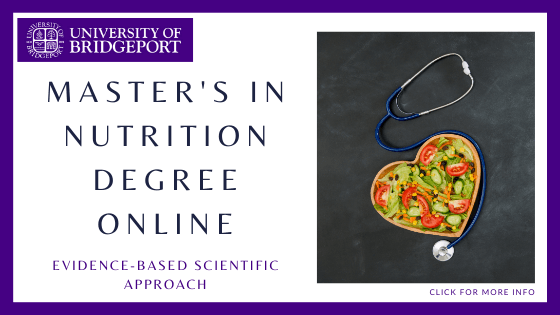If you are considering an online nutrition degree, get ready for some great news! According to the Bureau of Labor Statistics, this field will experience double the national employment growth rate between 2019 and 2029. This makes now a great time to take advantage of flexible, affordable online degree programs to invest in yourself and your future!
Becoming a nutritionist requires a bachelor’s degree. Supervised training is also required and nutritionists typically must obtain at least one dietetic certificate or license. Certification requirements may overlap with those for Registered Dietician Nutritionists.
The 5 Best Online Nutrition Degree Programs out there are:
- Stanford Center for Health Education
- Arizona State University
- Purdue University Global
- The University of Bridgeport
- Liberty University Online
However, the exact number of training hours and which certifications you need depend on the regulations of your state. Some states only have certification requirements for certain jobs or the use of certain titles. But before any of that, you still have to earn a bachelor’s degree, which means hunting for a quality degree program. Keep reading to learn about the 5 best online nutrition degree programs.
Article Contents
Can You Get a Nutritionist Degree Online?
Colleges and universities seem to offer every degree program online now, touting flexible schedules, affordable prices, and course availability that a traditional campus experience could never beat. This includes nutrition degrees, with many institutions providing undergraduate and graduate programs, as well as certification courses.
However, your options might be limited depending on what you need. Not all universities offer every kind of program, instead opting to invest in only one or two. For example, Stanford offers a certification course on nutrition, but not undergraduate or graduate programs. However, there are still many benefits of nutrition courses online.
Furthermore, future nutritionists must often complete 1,000 or more hours of supervised training and experience before they are qualified for licensing, registration, and/or certification. Online degree programs may not include opportunities to pursue this training, instead expecting distance students to secure internships themselves.
Can I Be a Nutritionist Without a Degree?
Even in states where certification is not required to practice as a nutritionist, most employers are still likely to require a college degree. It could be possible to practice independently; however, insurance companies may not offer coverage to patients for your services, deterring potential clients.
Additionally, a college degree is often required to pursue independent certifications. Applicants to the Registered Dietician Nutritionist exam currently need at least a bachelor’s degree from specially accredited programs, while applicants to the Certified Nutrition Specialist exam are required to have a related master’s degree.
If you are a professional in a related field, such as a general practitioner or a sports therapist, then consider pursuing accreditation instead of a degree. For those who already have a degree, certifications such as the Certified Nutrition Specialist program only require some additional dietetic coursework, an internship, and a registration exam. Other nutrition-related certifications can include:
- Registered Dietician Nutritionist credential
- Health Education Specialist credential
- American Clinical Board of Nutrition-certified Doctorate
- Strength & Conditioning Specialist Certifications
- Independent credentials (such as that offered by Stanford’s Nutrition Science course below)

Generally speaking, many credentials still have education requirements that vary between credentials and between credentialing bodies. Additionally, the field of nutrition is constantly expanding and developing, so keep an eye out for new certification programs offered by appropriate organizations.
Be aware that due to the expansive development of this field, scams presenting themselves as legitimate professional or academic institutions may market unverified credential opportunities. While many credentials require the payment of application or exam fees, no legitimate nutritionist credential can be bought outright.
Once you have decided to pursue a credential, make sure to research the background of the certification, such as the history and qualifications of the organization in charge of creating credential requirements and/or conferring the credentials themselves. Check for credible parent organizations and relationships with government agencies.
How Long Does It Take to Become a Nutritionist Online?
The time it takes to become a nutritionist depends on who you are and what you want. Each type of certification program is a different length of time, and some requirements are determined by the educational background of the individual. However, most dietetic programs either require at least a bachelor’s degree or take the same amount of time.
Perhaps the most commonly accepted nutritionist credential is the Registered Dietician Nutritionist certification. Many states with regulations on required nutritionist licensing and credentialing have eligibility structures similar to those for this certification, and it is more standardized than individual state regulations across the country.
The Academy of Nutrition and Dietetics accredit nutrition degree programs through ACEND, the Accreditation Council for Education in Nutrition and Dietetics, while the Commission of Dietetic Registration serves as the Academy’s credentialing arm by managing the Registered Dietician Nutritionist exam. There are three kinds of programs:
- Dietetic Internship Programs require a bachelor’s degree and completion of an ACEND-accredited academic program. Fortunately, many universities offer approved degrees so that you can be eligible for a dietetic internship at graduation. Completing the 1,000-hour program qualifies you for the RDN exam.
- Coordinated Dietetic Programs require a bachelor’s degree and completion of an ACEND-accredited Coordinated Program. Again, collegiate degree programs that align with ACEND coordinated programs can satisfy both requirements, such that completion of the degree qualifies you for the RDN exam.
- Individualized Supervised Practice Pathways have two forms: one requires a bachelor’s degree, completion of an accredited academic program, and replaces a dietetic internship with an approved ISPP. Alternatively, you can apply to an ISPP with a doctorate, and completing one qualifies you for the RDN exam.
However, the Commission on Dietetic Registration has updated eligibility requirements for taking the exam, allowing only applicants with master’s degrees to take the exam starting January 1st, 2024. Even if you were to start a four-year Coordinated Program now, you may not qualify for the Registered Dietician Nutritionist exam by graduation.
For a high school graduate trying to become a nutritionist online, the fastest way is through a Coordinated Program. However, it will take four to six years of collegiate education and supervised training before you are eligible for the exam. Further, many online programs expect students to seek supervised training independently.
Professionals that already possess a master’s degree may be able to complete a dietetic degree program in less time by discussing credit transfers and waivers with individual universities. Additionally, they may qualify for the Certified Nutrition Specialist exam, which does not require a master’s degree from a specially-certified program.
Don’t forget that you have to also put in work after the degrees. You will need to create an online nutrition course, market yourself, research, study, and more. There are many things that must be done after the degree to become an online nutrition coach.
The 5 Best Online Nutrition Degree Programs
Whether you are just starting your college career, returning for another degree, or a professional looking to broaden your understanding, there’s definitely an online nutrition program for you. From certifications to master’s degrees, each of these five online nutrition programs offers top-tier educational services.
Future nutritionists in search of a bachelor’s degree should take a look at the online programs offered by Arizona State University and Purdue University Global. These institutions, along with Liberty University and the University of Bridgeport, also offer master’s degrees and options for certification exam preparation.
On the other hand, professionals and other degree holders may be more interested in accredited programs, such as the Master of Science in Nutritional Science (Dietetics) offered by Arizona State University, while Stanford University offers an independent professional certification course.
1. Stanford Center for Health Education
For professionals, graduates, or even just the curious-minded interested in learning more about nutrition, the Stanford School of Medicine offers an 8-10 week distance course on nutrition science to students through the Stanford Centre for Health Education.
While other programs in this list are unified academic plans, this professional education course is offered independently of a cohesive program. Completion of this course awards the participant with a professional certificate in nutrition science, rather than a degree or preparation for a nutritionist registration exam.
Additionally, while the Stanford Centre for Health Education has a plethora of opportunities for graduates and professionals to build both their knowledge and credentials, it does not offer degree programs. The Stanford School of Medicine also does not currently have any nutrition-focused degree paths available online.
Professional programs offered by Stanford University have minimal admission requirements and are usually open to applicants regardless of educational background. Some programs may require a short application to ensure that a prospective student has the background knowledge to succeed, but otherwise do not require a degree.
This means that unlike the other universities listed here, the professional nutrition science course offered by the Stanford Centre for Health Education does not require the pursuit of a degree before or during the course to attempt it. Students would only need to enroll and pay tuition, which is approximately $2,400 for this course.
2. Arizona State University's Program
If you’re looking for an established online university with plenty of options, then look no further than Arizona State University’s five undergraduate nutrition programs and three graduate degree programs. Students without a bachelor’s degree can find one here, as well as the potential to continue their online education at the same institution!
The many undergraduate program offerings of Arizona State University include:
- Bachelor of Science in Community Health
- Bachelor of Applied Science in Food and Nutrition Entrepreneurship
- Bachelor of Science in Food and Nutrition Entrepreneurship
- Bachelor of Science in Health Education and Health Promotion
- Bachelor of Science in Health Sciences – Healthy Lifestyles and Fitness Science
In particular, the B.S in Community Health and the B.S in Health Education and Health Promotion are each designed to qualify graduates for the Certified Health Education Specialist exam, which is regulated by the National Commission on Health Education Credentialing.
While these credentials may not be specific to nutritionists, they would qualify you as capable of providing health education and promotion, which may be useful to your career as a nutritionist. Nutritionists interested in public health should consider these degrees because they incorporate a focus on educating others into their coursework.
Students interested in pursuing a master’s degree can consider the following graduate programs offered by Arizona State University:
- Master of Science in Medical Nutrition
- Master of Science in Nutritional Science (Dietetics)
- Master of Science in Regulatory Science – Food Safety
Each of these graduate degree programs is entirely online. However, only the M.S. in Nutritional Science prepares graduates for Dietetic Internships and the Registered Dietician Nutritionist exam, while the M.S. in Regulatory Science is designed to prepare students for the National Environmental Health Association’s food safety certification.
3. Purdue University Global
Prospective nutritionists that only need a bachelor’s degree, or that do not mind continuing to their graduate education at a different institution, may be interested in Purdue University Global. This university has a Bachelor of Science in Nutrition accredited by the National Association of Nutrition Professionals.
Unfortunately, Purdue currently only offers this one nutrition degree online, and does have any other options for undergraduate programs in related fields. Some of these degree programs include:
- Bachelor of Science in Health and Wellness
- Bachelor of Science in Health Science
- Bachelor of Science in Health Information Management
- Bachelor of Science in Health Care Administration
This school also lacks graduate-level nutrition programs, so students trying to pursue a master’s degree or the Registered Dietician Nutritionist credential will have to look elsewhere.
However, Purdue University Global does offer the option to work on your bachelor’s degree and master’s degree concurrently, which is an attractive option if your career goals are better reached by a master’s in Public Health or Health Education rather than certification. Purdue’s graduate degrees also include:
- Master of Health Information Management
- Master of Health Informatics
- Master of Health Care Administration
Furthermore, Purdue’s online programs also have rolling application deadlines and course start dates. This is true for both undergraduate and graduate programs, so nutrition students in need of short-term and long-term flexibility should consider this undergraduate degree.
4. The University of Bridgeport
This university also has only one kind of nutrition degree: a Master of Science in Nutrition. Offered by Bridgeport’s own Human Nutrition Institute, this program is accredited by the Connecticut Board of Governor’s Office of Higher Education as well as the Accreditation Council on Nutrition Professional Education.
While Bridgeport does not offer any other program options for students of nutrition, this master’s degree is entirely online and is accepted by the Board for Certification of Nutrition Specialists as a satisfactory coursework prerequisite to sitting for the Certified Nutrition Specialist exam.
The University of Bridgeport master’s program is not accredited by ACEND, however, so this coursework does not satisfy the education requirements for applications to participate in an ACEND-approved Dietetic Internship or take the Registered Dietician Nutritionist exam.
For students invested in a long-term degree plan and wanting a similarly long-term relationship with their university of choice, this degree can offer credit towards the diplomate program created by the American Clinical Board of Nutrition. Entry into the diplomate program requires a Doctorate, so this degree is an advantageous foundation.
5. Liberty University Online
Students interested in a Master of Science and looking for a friendly, religiously affiliated university will be happy to know that Liberty University can provide students with a Master of Science in Exercise Science and Wellness – Nutrition and Wellness and a learning environment supported by Christian values.
Accredited by the Commission for the Accreditation of Allied Health Education Programs, this master’s degree is completely online. It also provides opportunities to earn additional certifications, such as:
- First Aid Certification
- CPR Certification
- AED Certification
- Strength & Conditioning Specialist Certifications (accredited by the National Strength and Conditioning Association)
However, this master’s degree program is not accredited by ACEND as preparation for either an approved Dietetic Internship or the Registered Dietician Nutritionist exam. Liberty University also does not offer any other online degree programs in nutrition or dietitian fields.
This institution has the potential to be the most affordable option for many students because the internet-based aspect Liberty University is considered completely non-profit, and has had no changes to online tuition in six years. If you are struggling to afford a nutrition degree, check out their programs for financially challenged students.
Anyone Can Become a Nutritionist Online
There are abundant opportunities to become a nutritionist online, as well as pathways to continuing education and career advancement. Once you have completed an online nutrition degree, you will also be able to pursue academic and professional advancement in the form of higher-level degrees and career-opening certifications.
Student’s attempting their first degree should prepare for both a bachelor’s degree and a master’s degree in nutrition-related fields, as well as consider accelerated degree programs and programs that include the supervised training hours needed to be eligible for state licensing and certain certification exams.
Graduate and post-graduate students should consider whether more advanced education or specific credentialing is necessary for their career goals before choosing a high-level degree program. Professionals in associated fields, such as healthcare, should investigate nutritionist credentialing options supported by their education history.
Regardless of professional or educational background, becoming a nutritionist online can be an easy and affordable alternative to a traditional campus program. Whether you are just starting your college career or continuing your professional education, be sure to investigate the many options available to help you become a nutritionist.









